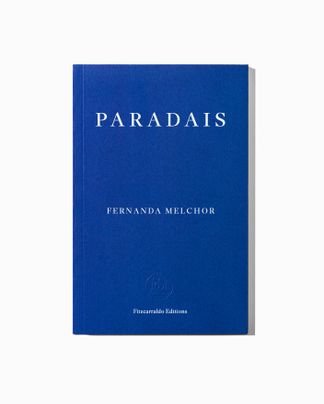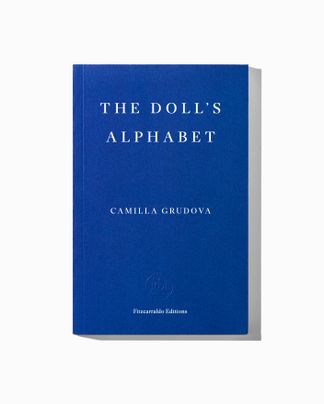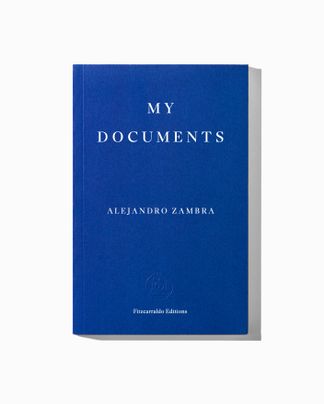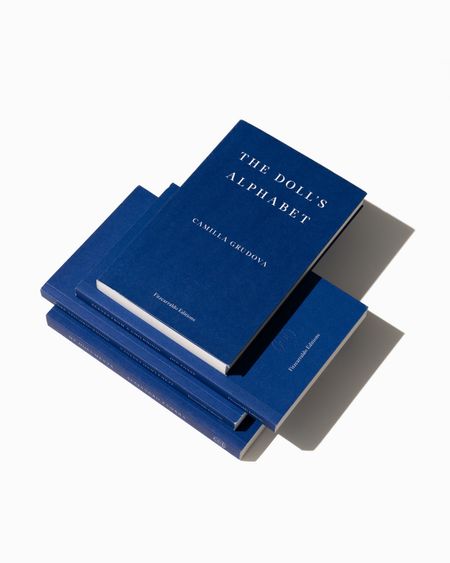When an albatross strays too far from its home, or loses its bearings, it becomes an ‘accidental’, an unmoored wanderer. The protagonists of these eight stories each find the ordinary courses of their lives disrupted by an unexpected event and are pushed into unfamiliar terrain: a girl encounters her uncle in hospital, who was cast out of the family for reasons unknown; a menacing force hovers over a fracturing family on a rural holiday; a couple and their children inhabit a stifling world where it is better to be asleep than awake; a man’s desire for a solution to his marital dissatisfaction has unforeseen consequences. Deft and disquieting, oscillating between the real and the fantastical, The Accidentals is the brilliant new book from International Booker-shortlisted duo Guadalupe Nettel and Rosalind Harvey.
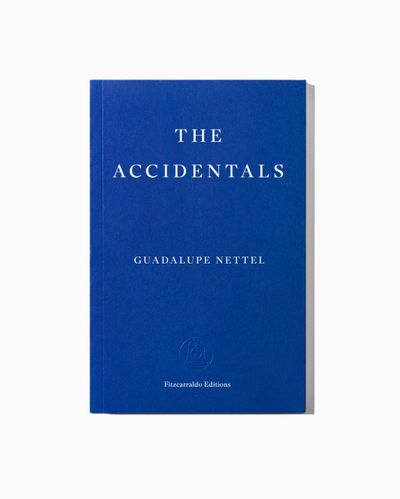
The Accidentals
Translated by Rosalind Harvey
French paperback with flaps, 128 pages | Audiobook read by Grecia Almada, Julian Franco and Silvana Kane
Published 10 April 2025
The Accidentals
Translated by Rosalind Harvey
0
IMPRINTING
Before he died, my uncle was in hospital for three weeks. I found out due to a coincidence, or what the surrealists used to call ‘objective chance’, to describe those fortuitous events that seem dictated by our destiny. Around this time, my best friend Verónica’s mother was suffering from very late-stage cancer and was a patient in the intensive care unit at the same clinic. One morning, Verónica had asked me to go with her to visit her mother, and I couldn’t say no. We left the university, which was in the same neighbourhood, and, instead of going to our Latin etymology class, we got on the bus. As I wandered through the corridors waiting for Verónica to attend to her mother, I amused myself by reading the names of patients on the doors. Seeing my uncle’s was enough to understand he was a relative, but it took me some time to figure out who he was. After several seconds of confusion – a feeling comparable to when we discover in a cemetery a tombstone with our surname on it, with no idea to whom it belongs – I realized that the sick man was Frank, my mother’s older brother. I was aware of his existence, but I didn’t know him. He was the exiled relative of my family, as it were, a man nobody mentioned out loud, let alone in front of my mum. Despite being filled with curiosity at that moment, I didn’t dare stick my head into the room lest he recognize me. An absurd fear, really, since as far as I knew we’d never met.
I stayed there for a good while, not knowing what to do, concentrating on my heartbeat, which only grew faster and faster, until the door opened and two women dressed in white emerged from the room. One of them was holding a breakfast tray with dirty plates on it.
‘That man eats more than a St. Bernard. Who would have thought it in his state?’
It amused me to find out that the nurses joked about their patients, as did the possibility that my uncle was an imaginary invalid like Molière’s, whom we were reading in my drama class.
On the bus on the way back to the university, I told Verónica about my discovery. I also told her everything I knew about Frank. A good student from primary school up until the final year of exams, he had obtained an impeccable reputation at school, as well as the admiration of all his teachers. He was always able to count on my grandmother’s collusion for this – as I once heard my mother say – because she would provide excuses for his absences from class, as well as his antics at home. After completing one year of an engineering degree, he quit to devote himself to photography, and then later on to wandering the globe. My relatives spoke too about his vices and addictions, but I never heard anyone specify exactly what sort these were. He was never present for the big events in my family, my brother’s graduation or my fifteenth birthday, occasions where gaggles of relatives would sprout as if by spontaneous generation and to whom I had to introduce myself several times over. All of my uncles would be there, apart from Frank. On occasion I would hear old friends of my parents ask after him with morbid curiosity, as you might ask after someone when you know, without a shadow of a doubt, that there will be some sort of hilarious new titbit. It was impossible, at least for me, not to notice how uncomfortable my mother was when answering questions about her brother’s whereabouts. I know he’s in Asia, she would say, or, He’s still with his girlfriend, the sculptor. The things I knew about him I had heard in passing, as in those instances, but at the time, Frank’s life didn’t interest me a great deal.
The following day I asked Verónica if she would let me accompany her to the hospital. This time we missed a linguistics and phonology class, the most boring of all. We got to the hospital at around midday. Once my friend had gone into her mother’s room, I waited a few minutes and then, after making sure there were no nurses in Frank’s room, I knocked at the door and went in. It was the first time I stood before his bed, a place I would return to many times. My uncle was a robust-looking man with a shock of grey hair who did not, in effect, have the appearance of a sick man. What he did have was a combination of features very like my own. His expression, unlike the other patients, such as Verónica’s mother, was lucid, and he was conscious of everything happening around him. His left arm was connected via a catheter to a drip containing all sorts of medicines, but aside from this, and from a slight paralysis down the left-hand side of his face, he seemed ready to leap out of bed.
‘We don’t know each other,’ I said. ‘I’m Antonia, your niece.’
For a second or two I felt as if, rather than being a pleasant surprise, my presence had frightened him. It was a fleeting sensation, the brief flash caused by intuition, but as unmistakable to me as the shock I had felt the previous day when standing outside his door. Before replying, a seductive smile crossed his face, the same one he would offer me every time I went to visit him.
I’ve always thought it strange the familiarity we establish with someone unknown as soon as we find out they are related to us. I’m sure this has nothing to do with an immediate affinity, but rather with something artificial, such as culture, a conventional allegiance to the clan or, as some say, a surname. This, however, was not what took place between my uncle and me that morning. I don’t know if it was because of the irreverent reputation he enjoyed among my relatives, or the disobedience implied by having anything to do with him; the fact is, I felt an admiration similar to that evoked by characters from legend.
He asked me how I had found him and requested that I didn’t tell anyone. There was no way he wanted to get back in touch with my family. To reassure him, I explained that it had been by accident. I told him about Verónica and her mother, and assured him that he could count on my silence.
(…)
‘Oscillating between realism and dark fantasy, and impeccably translated by Rosalind Harvey, the stories in The Accidentals are delightful and disturbing, and confirm Nettel as one of the finest Mexican writers of her generation.’
— Ángel Gurría-Quintana, Financial Times
‘Guadalupe Nettel is widely regarded as a leading writer of her generation, and in various ways her four novels and three short story collections continue to seek out the fantastic that lurks in the interstices of everyday life…. Nettel’s prose, brought to us in Rosalind Harvey’s punctilious translation, is precise and formalized, with a wildness held back – like a neat picket fence confining a dangerous place. The title story is a heartbreaker without a superfluous line. An albatross, we’re told, that strays too far from home and loses its bearings, becomes an “accidental”, an unmoored wanderer. These stories illustrate different ways a person can become an accidental in their own world.’
— Lee Langley, The Spectator
‘Guadalupe Nettel yet again walks into uncertain terrain with these mysterious stories. There are secrets everywhere, she says, especially in life’s most intimate and familiar aspects. The Accidentals never loses its sense of things being out of joint, and Nettel explores these fears with calm and with beauty.’
— Mariana Enríquez, author of Our Share of Night
‘I adored this collection, it spread its roots out within me. Nettel is an extraordinary writer.’
— Daisy Johnson, author of The Hotel
‘The Accidentals is a striking and compelling collection that searches for the extraordinary within the ordinary. Each narrative veers seamlessly from the mundane to the existential; the writing is deft, and unsettling prose imbues the work with a profound resonance. I loved these stories, mad and controlled, and brilliant.’
— Elaine Feeney, author of All the Good Things You Deserve
‘Nettel is one of the leading lights in contemporary Latin American literature…. I envy how naturally she makes use of language; her resistance to ornamentation and artifice; and the almost stoic fortitude with which she dispenses her profound and penetrating knowledge of human nature.’
— Valeria Luiselli, author of Lost Children Archive
‘I love the work of Guadalupe Nettel, one of Mexico’s greatest living writers. Her fiction is brilliant and original, always suffused with sensuality and strange science.’
— Paul Theroux, author of The Mosquito Coast
‘Nettel is free. She has succeeded in creating an audacious narrative style all her own, a singular and fearless way of being in the world. An essential voice of the new Latin American literature.’
— Enrique Vila-Matas, author of Mac’s Problem
‘Slyly inventive and delightfully disquieting, The Accidentals is an incredible story collection filled with worlds both deceptively familiar and wondrously strange. A master of the form, Nettel draws each of her universes with great precision. Each story delivers a deliciously effective and haunting sting you’ll remember long afterwards.’
— Gina Chung, author of Green Frog
‘The stories in The Accidentals move through a landscape that is both foreign and familiar, mysterious and menacing, dreamy and distraught, and I had the palpable sense that anything might happen next. It is the kind of book you read in a single afternoon, gladly relinquishing the cares of day-to-day life to sink into its otherworldly submersions.’
— Jessie Ren Marshall, author of Women! In! Peril!
‘In this electrifying collection, Mexican writer Nettel stages sliding door moments for her characters and explores their life-altering consequences. With laser-like precision, the eight stories probe such universal aspects of the human condition as desire, loneliness, and memory…. In crisp and striking prose, Nettel mines the complexities of relationships, in which secrets and betrayals have the power to change everything. Readers will be wowed.’
— Publishers Weekly
‘Excelling at pinpointing the uneasy in the everyday, these stories delve into characters who find themselves adrift in an unstable world. Here, families don’t provide comfort, but instead provoke existential crisis and the dawning realization that close relationships can be emotionally suffocating rather than sustaining.’
— Eithne Farry, Daily Mail
‘The Accidentals, beautifully translated by Rosalind Harvey, begins with an epigraph from Anaïs Nin: “We don’t see things as they are, we see them as we are”. This entry point serves as a subtle warning. The eight stories that follow [take] us inside the apartments of Barcelona and the bayous of Louisiana, into the depths of the Bois de Vincennes and the parks of Mexico City. The subject matter varies too. There is a touch of the supernatural, of things being normal and yet somehow off…. The Accidentals is very good on desire. Nettel opens up eight little worlds in which she articulates the pain of badly wanting something and the feeling of emptiness when it is finally attained.’
— Oonagh Devitt-Tremblay, Times Literary Supplement
Guadalupe Nettel is a Mexican author of award-winning novels and short story collections. Her work has been translated into more than twenty languages and adapted for theatre and film. Still Born, her most recent novel, was shortlisted for the 2023 International Booker Prize. In 2008 she received a PhD in Literature from the EHESS in Paris. She has edited cultural and literary magazines such as Número Cero and Revista de la Universidad de México. She lives in Paris as a writer in residence at the Columbia University Institute for Ideas and Imagination.
Rosalind Harvey is a literary translator and educator. She has translated writers such as Juan Pablo Villalobos, Katya Adaui and Elvira Navarro, and her work has been shortlisted for the Guardian First Book Award and the Oxford-Weidenfeld Translation Prize, among others. She is a Fellow of the Royal Society of Literature, an Arts Foundation Fellow and a founding member of the Emerging Translators Network, and currently teaches on the MA in Literary Translation at the University of Warwick


